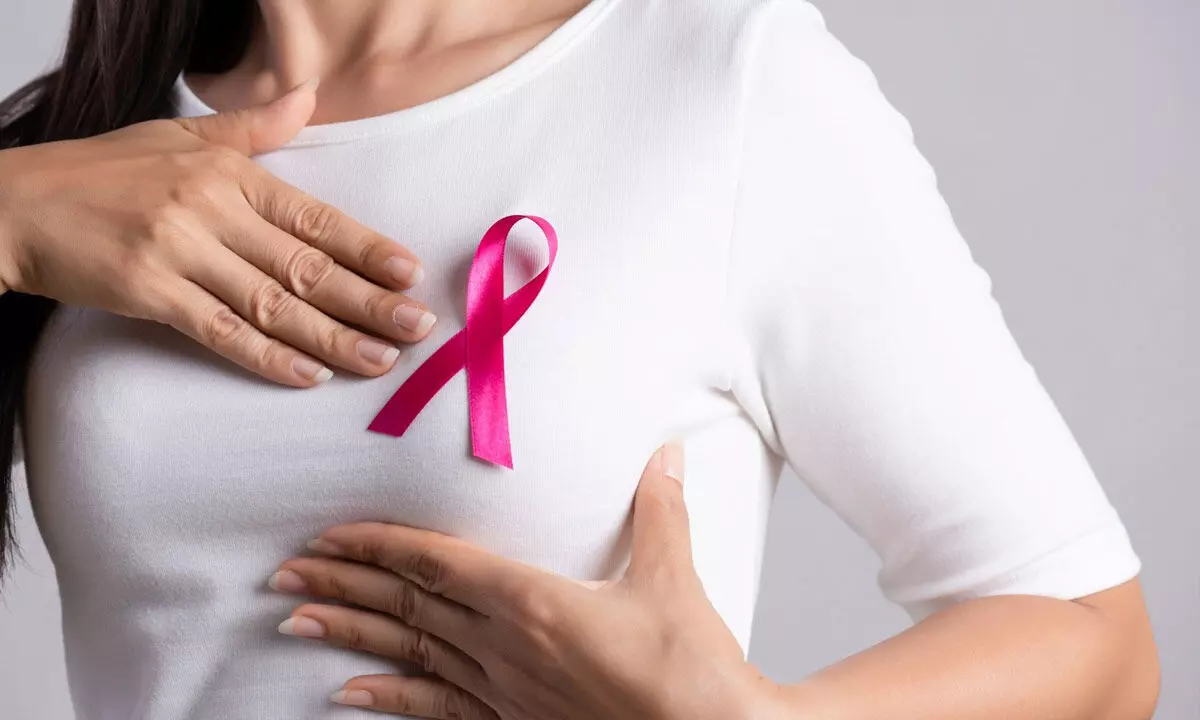Live
- Chanchalguda Jail Officials Say They Haven't Received Bail Papers Yet, Allu Arjun May Stay in Jail Tonight
- BJP leaders present evidence of illegal voters in Delhi, urge EC for swift action
- Exams will not be cancelled: BPSC chairman
- Nagesh Trophy: Karnataka, T.N win in Group A; Bihar, Rajasthan triumph in Group B
- YS Jagan condemns the arrest of Allu Arjun
- Economic and digital corridors to maritime connectivity, India and Italy building vision for future, says Italian Ambassador
- SMAT 2024: Patidar's heroics guide Madhya Pradesh to final after 13 years
- CCPA issues notices to 17 entities for violating direct selling rules
- Mamata expresses satisfaction over speedy conviction in minor girl rape-murder case
- Transparent Survey Process for Indiramma Housing Scheme Directed by District Collector
Just In
25% of breast cancer incidence observed in women under 40 years


Over 25% of breast cancer diagnosis are in women less than 40 years of age, finds healthcare provider, Apollo.
Over 25% of breast cancer diagnosis are in women less than 40 years of age, finds healthcare provider, Apollo. Analysing close to 150,000 screenings over the past five years, the data also showed that the median age of breast cancer incidence among Indian women is almost ten years earlier than in Western countries like the USA and UK. This highlights a critical need for increasing awareness and early intervention through screening and diagnosis among Indian women.
Key findings from screenings:
Earlier Onset of Breast Cancer: A striking 25 percent of breast cancer cases among Indian women occurred at the age of 39 years or less. The recorded minimum age at the time of breast cancer diagnosis is 23 years.
Consistent Average Age: Apollo’s data consistently indicated breast cancer diagnosis among Indian women is at an average age of 53 years, notably lower than the median age of 62 years in Western countries like the USA and UK.
Median Age (2018-2023): 53 years
Median Age (2018-2021): 53 years
Median Age (Jan 2022 - Aug 2023): 52 years
Significant Positive Predictive Value: A notable 23 percent screened with Mammography was found to have some abnormality and underwent further evaluation with histopathology. 11.2 percent of these were diagnosed with breast cancer.
Commenting on this, Dr Sathya Sriram, CEO – of preventive Health, Apollo, said, “Global guidelines have advocated for initiating regular breast cancer screening at the age of 40 years. However, the evolving landscape and these findings necessitate a re-evaluation of these guidelines, especially for Indian women. The misconception that cancer is an improbable cause of health issues in younger age groups often results in delayed diagnoses, potentially leading to missed opportunities for early intervention, better outcomes, and survival rates. I urge women across the nation to prioritize timely screenings and also encourage physicians to personalise their recommendation to patients, especially if they have a family history of cancer.”
Dr Manjula Rao, Breast Cancer Specialist and Oncoplastic Surgeon, Apollo Proton Cancer Centre (APCC), stated, “More than sixty percent of breast cancer patients in India present in more advanced stages, with increased breast cancer-related mortality when compared to the West, which reports lower mortality rate, despite higher incidence of the disease. This highlights the relevance of public awareness and breast cancer screening, which helps in early detection. I would like to emphasize that early detection is paramount in the fight against breast cancer, and we at APCC have achieved a great level of success in treating breast cancer diagnosed in the early stages. We have accomplished breast conservation rates 60 percent, and are able to de-escalate therapy as per global evidence-based guidelines, hence offering our patients superior quality of life outcomes.”
By prioritizing routine check-ups and adopting a vigilant stance toward breast health, women can be empowered to take charge of their well-being. A few measures include:
l Breast self-exams every month starting at age 20 to familiarise yourself with any changes that may occur over time, including lumps, skin changes, or discharge.
l Starting at age 30, women should have an annual clinical breast exam by a doctor or a trained healthcare professional. For those under 40, a combination of tests, including a clinical exam and ultrasound, is recommended. Yearly visits to the doctor for a tailored breast health screening plan are advisable, which may also include a mammogram and MRI based on individual risk factors.

© 2024 Hyderabad Media House Limited/The Hans India. All rights reserved. Powered by hocalwire.com






